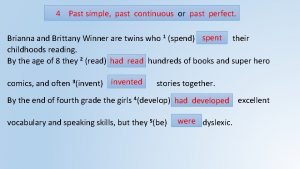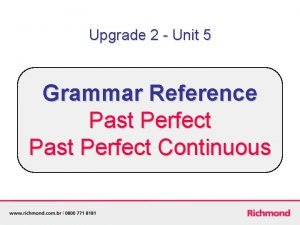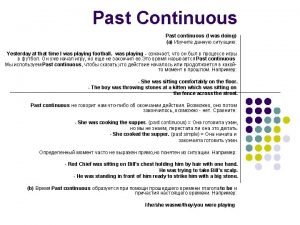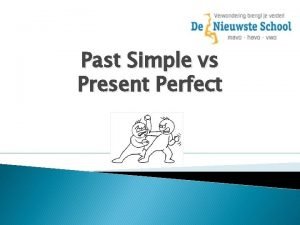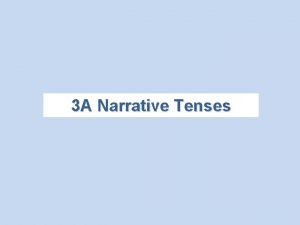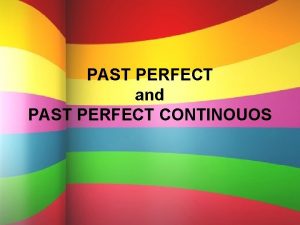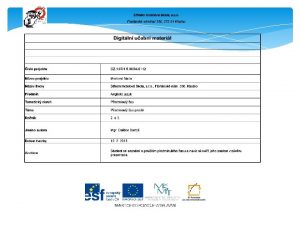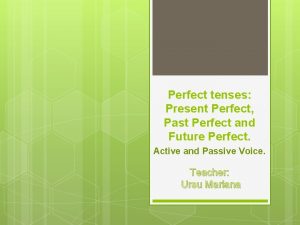THE PAST PERFECT The PAST PERFECT is formed













- Slides: 13

THE PAST PERFECT

The PAST PERFECT is formed by HAD + PAST PARTICIPLE

The PAST PERFECT – Positive form I had worked I’d worked You had worked You’d worked He / She / It had worked He / She / It’d worked We had worked We’d worked You had worked You’d worked They had worked They’d worked

The PAST PERFECT – Negative form I hadn’t worked or I had not worked You hadn’t worked or You had not worked He / She / It hadn’t worked or He / She / It had not worked We hadn’t worked or We had not worked You hadn’t worked or You had not worked They hadn’t worked or They had not worked

The PAST PERFECT – Interrogative form Had I worked? Had you worked? Had he / she / it worked? Had we worked? Had you worked? Had they worked?

Il Past Perfect corrisponde al trapassato prossimo italiano. Di solito il Past Perfect si usa in una frase con il Simple Past per parlare di un’azione che è avvenuta. . . PRIMA di un’altra azione nel passato. I passed the test because I had studied a lot. SIMPLE PAST Azione che è avvenuta DOPO PAST PERFECT Azione che è avvenuta PRIMA

When I got to school the lesson had already started. SIMPLE PAST PERFECT Azione che è avvenuta DOPO Azione che è avvenuta PRIMA After she had eaten, she went for a walk. PAST PERFECT Azione che è avvenuta PRIMA SIMPLE PAST Azione che è avvenuta DOPO

When he (arrive) arrived at the station, the train (already / leave) had already left.

When he (arrive) arrived at the station, the train (yet / leave) hadn’t left yet.

They (start) had started home. eating when she (get) got

She (wake up) woke up in the middle of the night because she (have) had a nightmare.

Key word transformation Complete the second sentence so that it has a similar meaning to the first sentence, using the word given. Do not change the word given. You must use between two and five words, including the word given.

The play started before we could get there. had (already) started when we got there. HAD The play ……………. . . The newspaper accused Pete of pushing the other player. had pushed the other player. The newspaper said that Pete ……………. . … HAD He told me it hadn’t been easy for him to learn how to surf. had difficulty (in) learning He told me he …………………. . . how to surf. DIFFICULTY He had never seen such a horrible film before. worst film he had ever It was the ………………… seen. WORST Before leaving, he checked the tyres. had checked the tyres, he set off. After he ………………. . HAD
 Past continuous and past perfect
Past continuous and past perfect Cuando usar past simple past continuous y past perfect
Cuando usar past simple past continuous y past perfect Past perfect present perfect future perfect
Past perfect present perfect future perfect Past perfect simple negative
Past perfect simple negative Past perfect vs past perfect continuous
Past perfect vs past perfect continuous Past simple past perfect past continuous
Past simple past perfect past continuous Past perfect simple
Past perfect simple Function of present continuous tense
Function of present continuous tense презент перфект таблица
презент перфект таблица Keywords present simple
Keywords present simple Narrative tenses past simple
Narrative tenses past simple Past simple past progressive present perfect
Past simple past progressive present perfect Past simple vs past continous
Past simple vs past continous Past simple past perfect past continuous exercises
Past simple past perfect past continuous exercises





